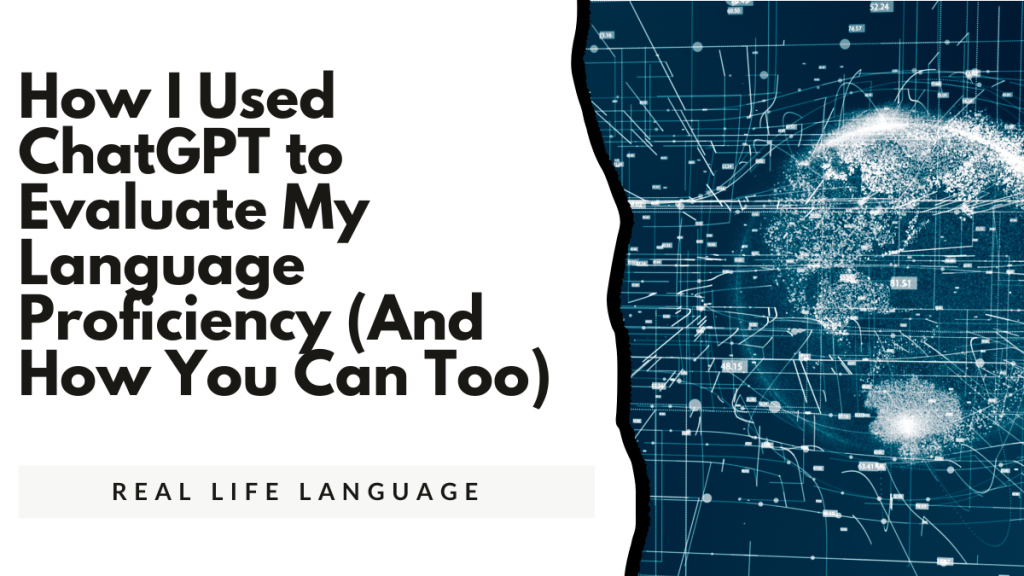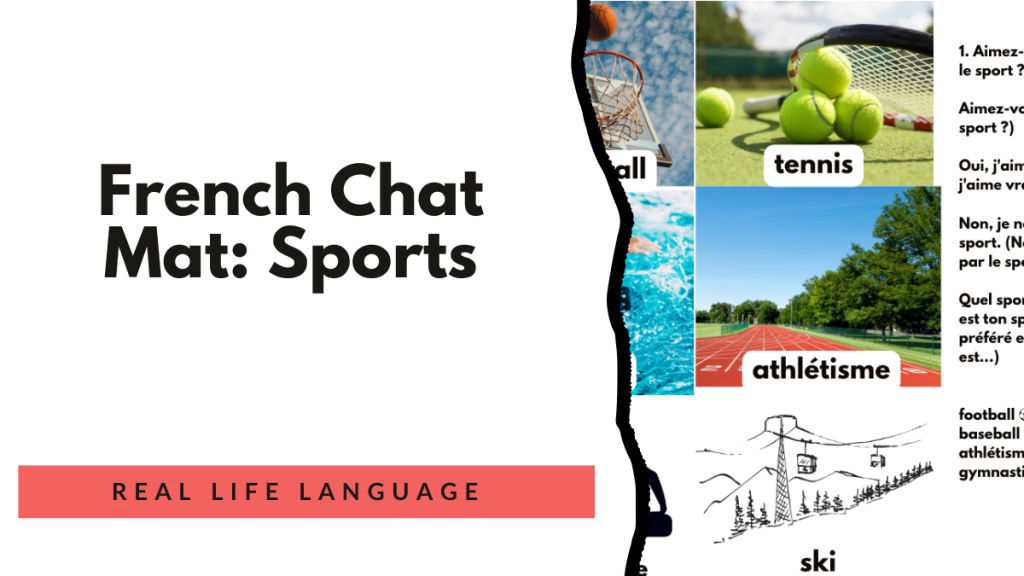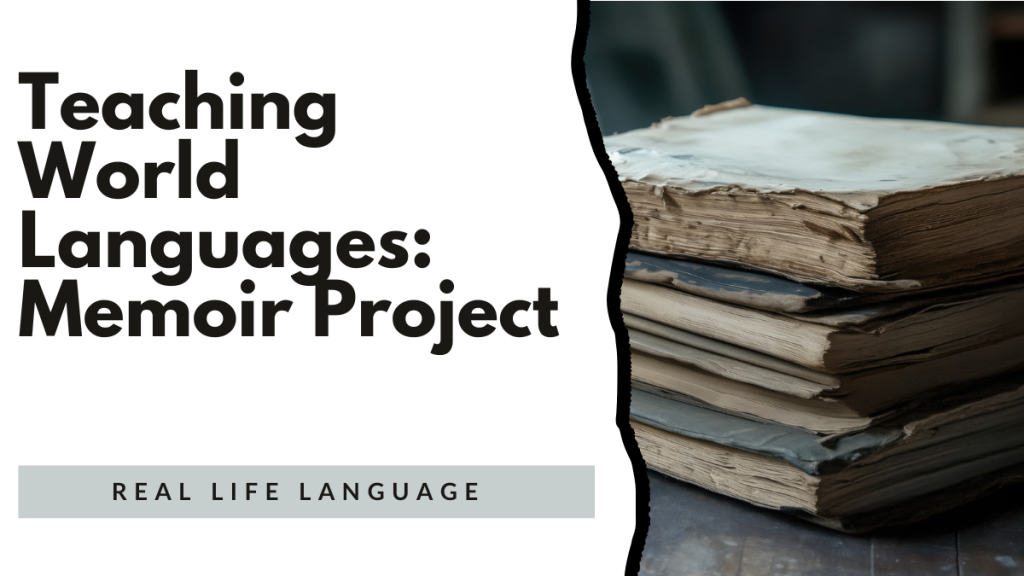
Here’s how it went.
I took transcripts of my spoken responses and pasted them into ChatGPT. Then I said, “Okay, evaluate my language proficiency.”
One important note—if you try this yourself, make sure to tell ChatGPT that your transcripts are from spoken responses. That’s key. A writing sample is usually more polished and doesn’t reflect the natural pauses, hesitations, or filler words (like “um” or “uh”) that show up in real conversation. Speaking and writing are different, and you want an evaluation that reflects your true speaking ability.
When I did this, ChatGPT evaluated my proficiency level in French as Intermediate High.
I’ve been experimenting with using ChatGPT as a language proficiency evaluation tool for a couple of years now. What I’ve found is that the margin of error tends to be about one level. I discovered this by testing it with samples that had already been officially scored—specifically AP World Language responses that are publicly available online.
I input both the sample and the official scoring rubric into ChatGPT and asked it to evaluate. In most cases, the result was either a perfect match with the College Board’s score or just one level off. That margin of error is consistent with what human raters experience too. In fact, when humans evaluate AP responses, there are often two raters—and if their scores differ by more than one level, a third rater steps in. So a margin of error of one? Totally normal and acceptable.
After that initial test, I evaluated one of my own samples again—and this time, I got Advanced Low, which still falls within that same margin of error.
Next, I plan to test my Spanish proficiency using the same method—hopefully soon!
To help others do this too, I created a self-evaluation workbook with proficiency tasks at the Novice, Intermediate, and Advanced levels. You can use it with any language. Here’s how it works:
- Choose a task based on your target level.
- Record and transcribe your spoken response.
- Ask ChatGPT to evaluate it using a specific rubric.
- Let it give you feedback and corrections—it’s actually great at offering targeted suggestions for improvement.
- Practice again and keep refining your skills until you’re consistently performing at your desired level.
Proficiency Progression for French Learners (Novice-Mid to Advanced-High)
(With Example Tasks and Student Responses)
See below some information on the ACTFL proficiency ranges/levels. This can be helpful for both teaching and learning French.
I was able to do a check in with my French after what felt like years of not speaking it.
Novice-Mid / Novice-Milieu
Checklist of Novice-Mid Features
- Uses memorized words, phrases, and simple sentences.
- Provides basic personal information.
- Answers simple questions about familiar topics.
- Relies on repetition, gestures, or visuals.
- Produces formulaic language, not spontaneous or complex.
- Understandable in highly familiar contexts, with some errors.
Sample Tasks for Novice-Mid
- Introduce yourself with name, age, and where you live.
- Say what day it is and describe today’s weather.
- List 3 favorite foods or drinks.
- Say two activities you like to do after school.
- Describe a family member with simple words.
- Identify colors of five classroom objects.
- State what you have in your backpack.
- Say the time when looking at a clock.
- Name the days of the week in order.
- Create a simple shopping list of five items.
Example Student Response in French
Task: List 3 favorite foods or drinks.
Response:
J’aime la pizza. J’aime le chocolat. J’aime le jus d’orange.
Novice-High / Novice-Avancé
Checklist of Novice-High Features
- Uses phrases and simple connected sentences.
- Can ask and answer simple, rehearsed questions.
- Expands slightly on familiar topics.
- Produces less robotic, slightly more natural sentences.
- Still relies on familiar structures, with frequent errors.
Sample Tasks for Novice-High
- Introduce yourself with 3 or more details.
- Describe your daily routine with 4 actions.
- Describe 2 family members with details.
- Give opinions about foods you like and dislike.
- Describe your school schedule and favorite class.
- Describe what you do in summer and winter.
- Give directions to a place in your city.
- Invite someone to do something with time and place.
- Describe what you wear in different types of weather.
- Describe your weekend activities in 4 sentences.
Example Student Response in French
Task: Describe what you wear in different weather.
Response:
Quand il fait chaud, je porte un t-shirt et un short. Quand il fait froid, je porte un manteau et une écharpe. Quand il pleut, je porte un imperméable et je prends un parapluie.
Intermediate-Low / Intermédiaire-Bas
Checklist of Intermediate-Low Features
- Creates original sentences beyond memorized phrases.
- Handles familiar topics in present, past, or future.
- Answers questions with some added details.
- Produces connected sentences, not just lists.
- Errors are common but meaning is clear.
Sample Tasks for Intermediate-Low
- Describe your weekend with 4 connected sentences.
- Describe a holiday or celebration with details.
- Describe a past activity you enjoyed.
- Make plans for next weekend with a friend.
- Explain your daily routine with times.
- Give directions with landmarks.
- Describe your favorite movie or show.
- Talk about your school schedule and preferences.
- Explain what you pack for a trip and why.
- Describe your ideal day off in 4+ sentences.
Example Student Response in French
Task: Describe a past activity.
Response:
Samedi dernier, je suis allé au parc avec mes amis. Nous avons joué au foot et nous avons mangé une pizza après. C’était une journée très amusante.
Intermediate-Mid / Intermédiaire-Milieu
Checklist of Intermediate-Mid Features
- Produces paragraph-length connected sentences.
- Handles past, present, and future with some confidence.
- Sustains conversations on familiar topics.
- Provides reasons, preferences, and explanations.
- Errors occur but do not prevent communication.
Sample Tasks for Intermediate-Mid
- Tell a detailed story in the past.
- Describe your weekly schedule and explain why you like or dislike it.
- Make future travel plans with reasons.
- Compare two seasons or cities.
- Describe a problem and suggest a solution.
- Give advice for visitors to your city.
- Describe a tradition in a French-speaking country.
- Retell the plot of a film or book.
- Explain how to do something step by step.
- Describe your future goals and why they are important.
Example Student Response in French
Task: Make future travel plans with reasons.
Response:
Je vais aller à Paris l’été prochain. Je veux visiter la Tour Eiffel et manger dans les cafés français. Je vais voyager en train parce que c’est plus rapide. Je suis très excité parce que j’adore la culture française.
Intermediate-High / Intermédiaire-Avancé
Checklist of Intermediate-High Features
- Sustains organized conversation with ease on familiar topics.
- Narrates, describes, and explains across time frames.
- Uses transitions and reasons to support ideas.
- Clarifies or expands when needed.
- Communicates with confidence and coherence, despite minor errors.
Sample Tasks for Intermediate-High
- Tell a meaningful personal story with reflection.
- Compare two school systems or experiences.
- Defend an opinion with examples.
- Describe a problem and how you solved it.
- Create a travel guide for a French-speaking city.
- Explain a cultural tradition and compare it to your own.
- Give step-by-step instructions with purpose.
- Retell a movie with reactions and predictions.
- Describe future plans with reasons and consequences.
- Respond to unplanned interview questions.
Example Student Response in French
Task: Defend an opinion.
Response:
Je pense que les élèves ne devraient pas avoir trop de devoirs. Les devoirs sont importants, mais il faut aussi du temps pour se reposer. Par exemple, hier j’ai passé trois heures sur mes devoirs et je n’ai pas eu le temps de voir mes amis. C’est mieux d’avoir un équilibre entre le travail et le temps libre.
Advanced-Low / Avancé-Bas
Checklist of Advanced-Low Features
- Produces detailed, paragraph-length discourse.
- Organizes ideas logically with clear transitions.
- Defends opinions with examples and reasoning.
- Handles unplanned situations effectively.
- Demonstrates good control of grammar, with some errors in complexity.
Sample Tasks for Advanced-Low
- Tell a significant personal story with analysis.
- Compare cultural practices with insight.
- Defend an opinion on a social issue.
- Summarize and respond to an article or video.
- Explain the meaning of a cultural tradition.
- Offer advice with reasons and examples.
- Describe future career or life plans in depth.
- Participate in a simulated professional interview.
- Write a travel blog post with recommendations.
- Reflect on the benefits of learning languages.
Example Student Response in French
Task: Defend an opinion on technology.
Response:
Je pense que la technologie aide la communication, surtout avec les personnes qui vivent loin. Par exemple, j’appelle ma famille en vidéo chaque semaine. C’est vrai que parfois les gens passent trop de temps sur les écrans, mais si on utilise la technologie pour rester connectés, c’est une bonne chose.
Advanced-Mid / Avancé-Milieu
Checklist of Advanced-Mid Features
- Extends and supports ideas with logical development.
- Uses a range of vocabulary and cohesive devices.
- Manages unexpected turns in conversation flexibly.
- Communicates with few errors, even on unfamiliar topics.
- Sustains extended, organized presentations or discussions.
Sample Tasks for Advanced-Mid
- Deliver a detailed presentation on a global issue.
- Compare and analyze two cultural perspectives.
- Argue a position on a controversial topic with counterarguments.
- Evaluate the impact of a historical event or person.
- Debate an abstract concept or social value.
- Analyze media bias in two sources.
- Simulate a professional interview on an area of interest.
- Evaluate the role of technology in society.
- Propose a community improvement project.
- Reflect on personal identity shaped by multiple cultures.
Example Student Response in French
Task: Argue a position on school grades.
Response:
Je pense que les notes sont importantes, mais elles ne devraient pas être la seule façon d’évaluer les élèves. Les commentaires écrits aident les élèves à comprendre leurs erreurs et à progresser. Cependant, les notes donnent une idée rapide de la réussite. Il est important d’avoir les deux : des notes et des commentaires détaillés pour aider les élèves à apprendre.
Advanced-High / Avancé-Haut
Checklist of Advanced-High Features
- Produces extended, organized, and sophisticated discourse.
- Adapts language for formal or informal situations.
- Discusses abstract and hypothetical concepts.
- Handles unexpected challenges with ease.
- Demonstrates near-complete control of complex grammar and style.
Sample Tasks for Advanced-High
- Lead a panel on a global challenge.
- Write and present a persuasive editorial.
- Debate an abstract social value.
- Analyze media bias and audience impact.
- Simulate an academic or professional interview.
- Evaluate cultural impacts of technology.
- Analyze a work of literature or film.
- Propose a complex solution to a global problem.
- Discuss ethical implications of scientific advances.
- Reflect on personal identity across cultures.
Example Student Response in French
Task: Analyze a film’s message.
Response:
Le film Intouchables montre que les différences sociales ne doivent pas empêcher l’amitié. Le personnage principal, Driss, vient d’un milieu très différent de celui de Philippe, mais ils apprennent à se comprendre et à s’apprécier. Le film utilise l’humour pour parler de sujets sérieux comme le handicap et l’exclusion sociale. En fin de compte, Intouchables nous rappelle que les relations humaines sont plus fortes que les différences sociales.
I share some of my favorite activities that keep language learners excited, engaged, and actually acquiring the language—while making your planning (and life) so much easier. Get my weekly tips by signing up below.

